Black Glasses (2022)
Directed by: Dario Argento
Written by: Dario Argento, Franco Ferrini
Starring: Andrea Gherpelli, Andrea Zhang, Asia Argento, Ilenia Pastorelli
FRANCE/ITALY
AKA OCCHIALI NERI
AVAILABLE ON BLU-RAY AND DVD REGION 2 BLU-RAY ITALY AND FRANCE, TO STREAM ON SHUDDER SOMETIME IN THE AUTUMN
RUNNING TIME: 84 mins
REVIEWED BY: Dr Lenera
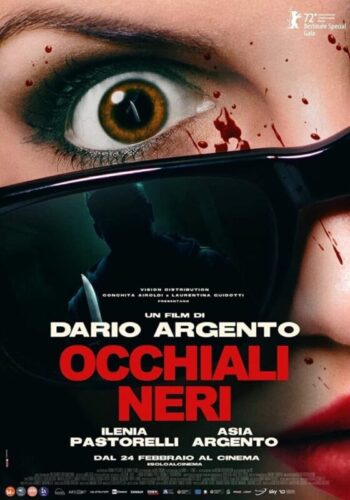
In Rome, a serial killer has strangled three prostitutes with cello rope. “The Cellist’s” next rope is destined for Diana, a high-class prostitute who frequents the hotels of Via Veneto. One night, Diana sees and flees the killer who rams her with his van, sending her crashing into another car killing the parents of a young boy named Chin. Diana awakens in a hospital, shrouded in darkness, Rita, a young woman from the Blind Society, helps Diana with her first steps in her new life, but The Cellist must finish his work and Chin is soon to be endangered too because he wants to leave the orphanage he’s at….
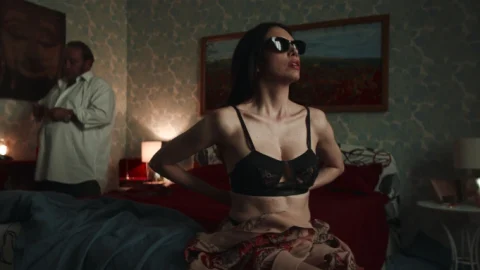
Has it really been ten years since Dario Argento’s widely panned version of Dracula? It certainly doesn’t seem as long ago when I sadly wrote my review of a film I wanted to love from a director whose style I fell in love with when I was in my “formation” years as not just a horror fan but a movie addict, a film that was instead yet another disappointment. 2022 has also seen Argento take a starring role on the big screen in Gaspar Noe’s Vortex, in addition to finally getting another movie off the ground after a few false starts. Black Glasses was originally intended to be shot back in 2002 until Cecchi Gori, the production company, filed for bankruptcy. Now, he’s dusted off the screenplay he wrote with his regular collaborator Franco Ferrini and made something which, I gather, is generally considered to be an improvement on his last few efforts even if it doesn’t even get anywhere near the Argento of old. And that’s a view that I would partly take. Yes, partly. I think we can safely say that the maker of Deep Red, Suspiria and The Stendahl Syndrome [his last great film] is long and gone, yet for this critic Black Glasses has more hints of that filmmaker than in any Argento film in a while, even if it still doesn’t entirely satisfy. The surprisingly simple, stripped down thriller employs a very familiar premise – a blind woman and a killer – and its second half is mostly a chase. It lacks some of the expected touches, such as no black gloves or mystery, though it’s also Argento’s most reflexive work. Of course he’s always been like this, obsessively repeating variations on the same ideas in film after film, but here the 81-year old is obviously very conscious that this could be his final film, and fills it with allusions yet still somehow avoids making a greatest hits package.
Every now and again Argento begins with an incredible opening that the rest of the film struggles to live up to [I’m especially looking at you, Sleepless]. He starts off Black Glasses with a scene that has a wonderfully strange atmosphere, though it’s an atmosphere that never returns in any great quantity. After a long distance shot of Rome, we mostly adopt the point of view of someone driving in their car, sometimes utilising two shots joined together, but it’s not the killer, it’s a prostitute going to meet her next client. She gets out of the car and walks across a park where an eclipse of the sun is happening, so she puts on the glasses which she will soon wear in a much sadder context. After the titles the quality certainly continues even though the film adopts a much more familiar vibe. In a hotel room the prostitute’s client gives her her money after which she goes outside to be garroted in gruesome style in the bushes. Inspector Aleadi suspects her client but he’s still inside the hotel, and a doorman says that he saw a white van – and, in the first and cheekiest of several neat transitions, we cut to someone spraying a black van with white paint. Our heroine Diana is introduced with three separate clients, one of whom gets rather nasty with her when she won’t let him fist her but she handles it. The really rather happy hooker isn’t happy for much longer though. A first encounter with The Cellist makes her blind and probably forever. Asia Argento, who would have probably played Diana if this had been made in 2002, turns up in an unusually non-sexual part as a Mobility And Orientation Instructor to help her out with things, though her role seems a bit cut down, a shame seeing as she and Ilenia Pastorelli certainly share some chemistry.
Diana soon gets a guide dog called Nerea which is also trained to attack people on command [are there guide dogs like that?] but is struggling to pay for food and the rent, so she goes back to her old job. After all, some guys will like the supposed vulnerability of a blind hooker and Nerea is always around. And soon Chin joins them, though she tells him that her job consists of “public relations, psychology sessions, things like that”. After Diana accidently killed her dad and put his mum in hospital, he’s looked after in a nunnery and unsurprisingly tells Diana to bugger off when she comes bearing a gift, but only a minute later changes his mind about her and then shows up at her apartment wanting to live there. This is perhaps the most glaring instance where the script has a character suddenly act differently just to move the plot forward even though it doesn’t make much sense. Still, Diana and Chin soon bond, the obvious inspiration being Carlo and Lori in The Cat O’ Nine Tails. Seeing as Argento expressed disappointment about his 1970 flick [even though I don’t find it disappointing at all], it maybe makes sense that he would lean heavily on it here, and it’s really nice to have a human relationship that we’re really invested in, and which is of a positive nature. In any case, things aren’t good for long for Diana, Chin and even Nerea as The Cellist is still around. Another neat cut goes from Diana and Chin in Chin’s apartment building to a window being smashed which we think is the doing of Diana and/or Chin but is actually the killer breaking into Diana’s abode. From here on in it’s basically a lot of fleeing, but Argento maintains the tension for the most part, woe betide anyone who gets in The Cellist’s way, and – well – are there really water snakes in Italy?
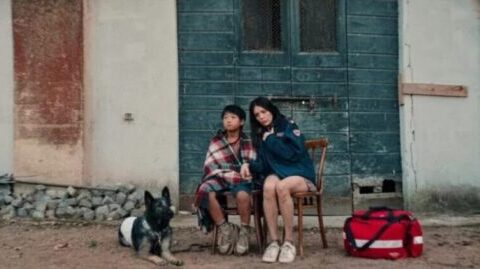
For the first time in a while we’re invited to really care about the plight of an Argento heroine, and one who’s convincingly and understandably grumpy for much of the time, even though Ilenia Pastorelli doesn’t quite pull off the part. For every very good moment – check out the bit where she’s been told on the phone that Chin’s mother is dead but doesn’t reveal it to a present Chin – there’s one that falters – watch out for shots where Pastorelli is running but isn’t running like a blind woman. Andrea Zhang as Chin certainly hits the mark more despite his role being much simpler. While we do get to see Pastorelli topless in two brief moments, Argento refuses to handle her job in an exploitative fashion, and it’s rather lovely to see Diana’s dignity and strength as a prostitute increase when blind, even though her character isn’t particularly complex and doesn’t undergo any development other than what I’ve just mentioned. Unfortunately, her nemesis isn’t written anywhere near as well. In fact he’s written rather poorly. He’s shown near the beginning and then a bit later in his killer garb, which may seem too early for some but the revelation is only a mild surprise anyway. However, his eventually revealed motivation for wanting to kill Diana is so laughably pathetic that one wonders why Argento and Ferrini bothered to include it at all, especially as it doesn’t even explain why he killed the three other women. But then I suppose it’s possible that Argento and Ferrini were mocking the traditionally daft and often convoluted explanations of killers in gialli. It’s hard to tell.
Something that does seem obvious is that Argento is a bit hemmed in by his very low budget, something which may have required some scaling down of the script. There are several potentially strong visual and technical moments which aren’t fully pulled off, such as a steadicam flight down a corridor where blue alternates with flashes of green. It’s great, but over far too quickly. Cinematographer Matteo Cocco’s good work still makes for a pictorially quite strong movie and there’s one haunting shot that’s stuck in my mind of the half-glimpsed killer, bathed in red against a black background, slowly advancing towards the viewer. It’s marvelous and creates a strong chill in the viewer, but we want more like this! Also haunting, but in a totally different way, are the rather poignant shots of some Rome streets, familiar from many gialli in the ‘7os, with bordered up buildings on the sides. This sadly reminds us of how Italian genre cinema has sadly been in a similar state for what seems like forever despite occasional shining lights making themselves known every now and again. The budget also sees special effects man Sergio Stivaletti having to reign himself in. After the first kill, successive ones are shown in quite a tame way even though what’s happening is pretty nasty, until we get to the climax where, in a film packed with moments that echo earlier ones in Argento’s ourvre, we get a detailed slice of viciousness which recalls a scene around the middle of one Argento film, recalls a scene right at the end of another Argento film, and also recalls a scene from a film made by his supposed rival during the ’80s and fellow member of the Holy Trinity of Italian Horror Lucio Fulci. I don’t want to go into details, but you’ll see what I mean. It would have had more effect if the previous few minutes, after a lot of quite exciting ones, hadn’t curiously slackened, but it provides an appropriately reflexive finale for us to finish on, and it may be a good idea for you to switch off there and then as if we were watching a film from the glory days, rather than to see it conclude with a really happy coda which seems antithetical to Argento’s world vision.
One can feel disappointed in that Daft Punk didn’t score the film as was originally intended, though their replacement Arnaud Rebotini actually does sterling work in the music department. His electronic score, a wonderful reminder of that period where every Italian horror film seemed to have an electronic score with very familiar harmonies and devices, has some diverse motifs and sometimes swells in a manner which, even for just a few minutes, makes us think back to that time where we were first seeing Argento’s masterworks and being so absolutely thrilled by the union of music and image. For a very long time, a major theme of Argento’s work has been the act of seeing [in many cases not seeing or not seeing properly], so it makes sense that his latest film should feature a character who goes blind. He doesn’t quite make the most of the concept, but still does okay. Supporting characters, especially Maria Rosaria Russo and Gennaro Iaccarino as two cops who think that Diana has kidnapped Chin, tend to be a bit colourless. An element of old Argento not mentioned much is how populated it was by people who may not have been proper characters but who were able to leave a lasting effect with just a few lines, even a simple look. Black Glasses doesn’t seem to have really restored Argento’s reputation which is a reputation that’s been a very tarnished one for some time, yet if approached on its own it’s a fairly neat little thriller with horror elements. With a bit of rewriting and more time and money, he could have pulled off something very striking here. As it stands, it feels rather like the work of a young, new filmmaker, one who’s grown up with Argento movies and is using them to fuel his own creation which is rather clumsy but also full of enthusiasm. And that’s a positive, adding a cyclical dimension to it all. It has all sorts of flaws, but Black Glasses really wouldn’t be an inappropriate film for Argento to finish with.
Rating: 









This review is based on a viewing of the Italian Blu-ray which has stunning picture quality though lacks any special features. The film will be on Shudder some time in autumn this year [I will update this review if and when a date is released], but let’s hope that one of our favourite labels gives it a really good release on physical media.


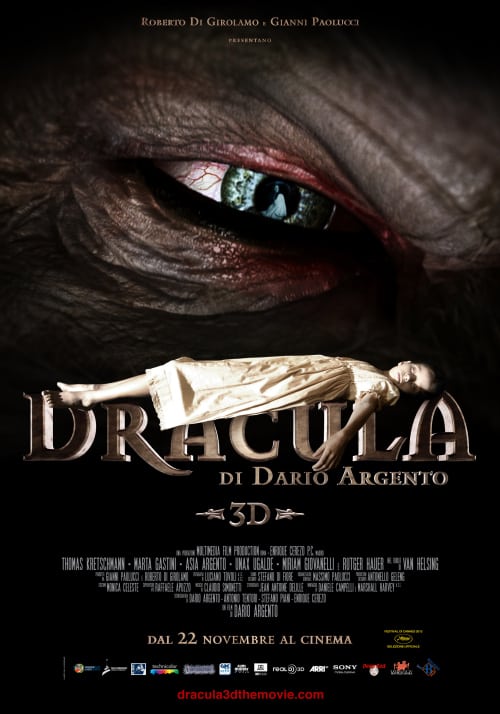
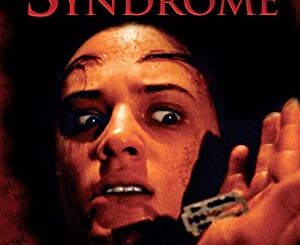

Be the first to comment